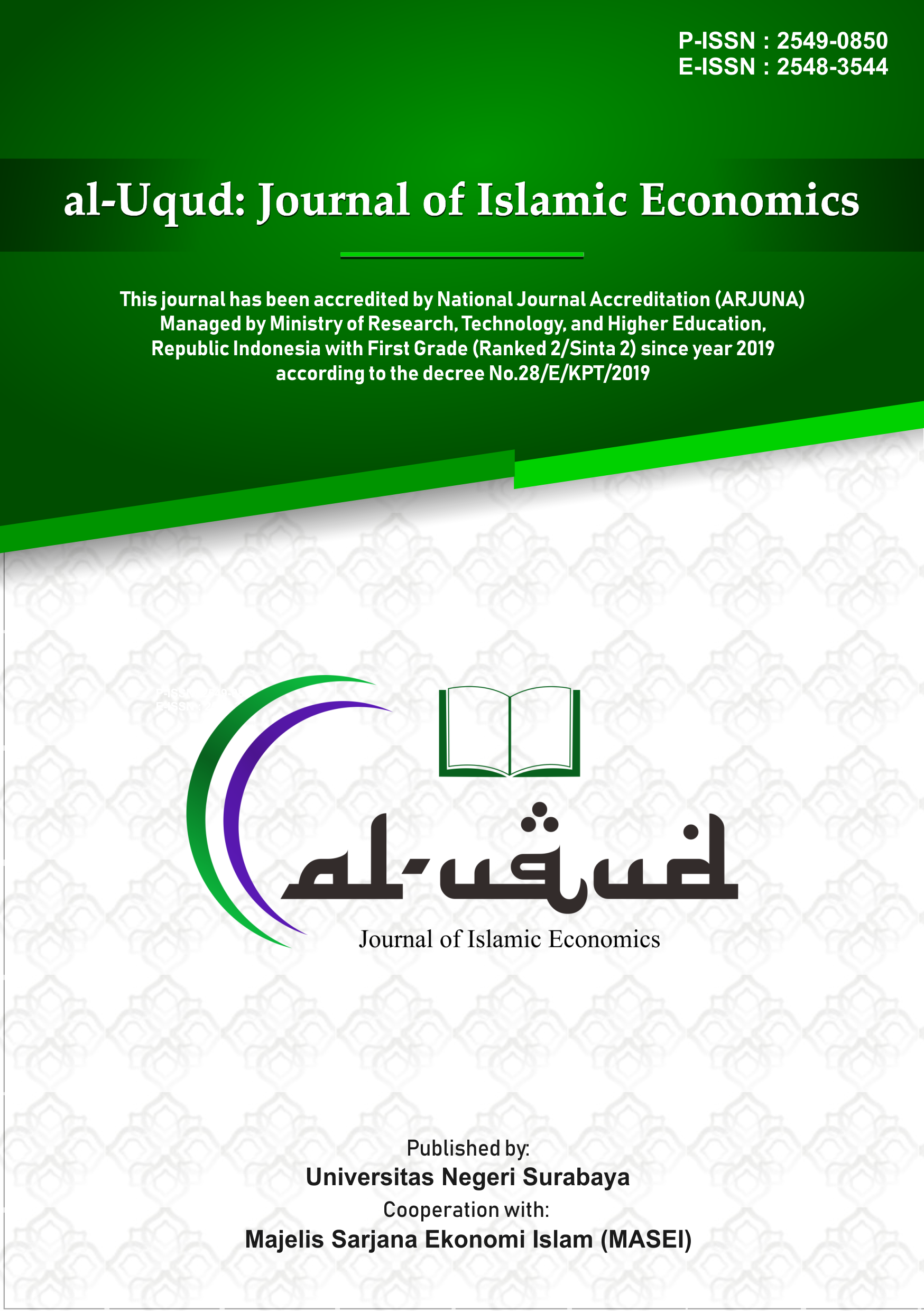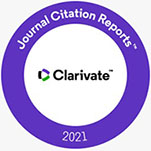Giving behaviour of zakat through crowdfunding platform: Evidence from Indonesia
DOI:
https://doi.org/10.26740/aluqud.v6n1.p23-40Keywords:
Muzaki, Giving behaviour, Crowdfunding platformAbstract
Zakat is undeniably an important instrument in Islamic economics that can support and improve the welfare of the people in Indonesia. With the high awareness of the Indonesian people in caring for others, the potential for collecting zakat funds in Indonesia is still not reaching the maximum level. By wielding the theoretical approach of the holistic spirituality model and its micro was giving behavioural constructs, which are transcribed into online survey indicators buttressed with in-depth interviews / direct observations, this study endeavours to understand and examine how the preferences and habits of Indonesian people in donating zakat (alms) through the crowdfunding portal. The study discovers that the crowdfunding portal classification is elaborated into two predominant clusters: the collaborative and corporate platforms. Corporations specialising in social finance fundraising issues created the first collective fashionable means. Various programs uploaded and generated within one platform website will create and initiate the program campaign by co-working and collaborating with others. The second corporate ones are designed and launched by the respective exclusive institution without other brand zakat involvement. Both initiations must be built by an official amil zakat institution. The preference of the zakat payer community is affected by literacy and frequent religiosity sense. Muzaki in entrusting and donating funds toward amil zakat institutions is not only prompted by its membership and affiliation of an institutional entity but also influenced by the inherent choice of literacy perception and religious understanding of individuals.
References
Almunia, M., Guceri, I., Lockwood, B., & Scharf, K. (2020). More giving or more givers? The effects of tax incentives on charitable donations in the UK. Journal of Public Economics, 183, 104114. https://doi.org/10.1016/j.jpubeco.2019.104114
Bank Indonesia. (2021). Laporan Perekonomian Provinsi Jawa Timur 2021 (East Java Economy Report 2021). Kantor Perwakilan Bank Indonesia Provinsi Jawa Timur (East Javal Office Branch of Bank Indonesia). https://www.bi.go.id/id/publikasi/laporan/lpp/default.aspx
Bethlehem, J. (2009). Applied Survey Methods: A Statistical Perspective. John Wiley & Sons, Inc. https://doi.org/10.1002/9780470494998
Bukve, O. (2019). Designing Social Science Research. Palgrave Macmillan. https://doi.org/https://doi.org/10.1007/978-3-030-03979-0
Center for Strategic Studies BAZNAS. (2019). Zakat Potential Mapping Indicator (IPPZ). In Center for Strategic Studies BAZNAS. Pusat Kajian Strategis (Center for Strategic Study) BAZNAS.
Center for Strategic Study BAZNAS. (2019). Zakat Literacy Index: Theory and Concept (Indeks Literasi Zakat: Teori dan Konsep).
Center for Strategic Study BAZNAS. (2020). National Survey on ZIS Collection from Non-Affiliated Society 2019-2020 (Survei Nasional Pengumpulan ZIS Partisipasi Masyarakat Non-OPZ 2019-202).
Crano, W. D., Brewer, M. B., & Lac, A. (2015). Principles and Methods of Social Research. Routledge Taylor and Francais. https://doi.org/10.1111/1467-9884.00369_4
Creswell, J. W. (2009). Research Design: Qualitative, Quantitative, and Mixed Methods Approaches. In Muqarnas (Third). SAGE Publication Ltd.
Creswell, J. W. (2014). Research Design_Qualitative, Quantitative, and Mixed methods Approaches (Fourth (ed.)). SAGE Publication Ltd. https://study.sagepub.com/creswellrd4e
Ferraro, E. F. (2015). Investigative Interviewing: Psychology, Method, and Practice. https://www.routledge.com/Investigative-Interviewing-Psychology-Method-and-Practice/Ferraro/p/book/9780367868307
Gross, R. (2019). Psychology The Science of Mind and Behaviour Sevent Edition (First). Hodder Education. https://www.hoddereducation.co.uk/grosspsychology
Hudaifah, A., Tutuko, B., Abdurrobi, P., S., Ishaq, A. A., & Albar, M. (2021). Sinergi Pengelolaan Zakat di Indonesia. In Scopindo Media Pustaka.
Johnson, R., & Morgan, G. (2016). Survey Scales, A Guide to Development, Analysis, and Reporting. The Guldford Press. https://www.guilford.com/books/Survey-Scales/Johnson-Morgan/9781462526963
Kowalski, C. M., Simpson, B., & Schermer, J. A. (2021). Predicting Donation Behaviour with the Supernumerary Personality Inventory. Personality and Individual Differences, 168, 110319. https://doi.org/10.1016/j.paid.2020.110319
Levine, R. A. (2016). Repairing the Fractured Social Sciences: An Introduction from a Historical Point of View 3. In M. C. Hay (Ed.), Methods That Matter_Integrating Mixed Methods for More Effective Social Science Research (p. 459). The University of Chicago Press, Ltd. https://doi.org/10.7208/chicago/9780226328836.001.0001
Maleki, F., & Hosseini, S. M. (2020). Charity Donation Intention via M-Payment Apps: Donor-Related, M-Payment System-Related, or Charity Brand-Related Factors, Which One is Overkill? In International Review on Public and Nonprofit Marketing (Vol. 17, Issue 4). International Review on Public and Nonprofit Marketing. https://doi.org/10.1007/s12208-020-00254-3
Oko, J. (2008). Understanding and Using Theory in Social Work (J. Parker & G. Bradley (eds.)). Learning Matters LtD. https://us.sagepub.com/en-us/nam/understanding-and-using-theory-in-social-work/book238660
Sasaki, S. (2019). Majority Size and Conformity Behavior in Charitable Giving: Field Evidence from A Donation-Based Crowdfunding Platform in Japan. In Journal of Economic Psychology (Vol. 70). Elsevier B.V. https://doi.org/10.1016/j.joep.2018.10.011
Statistic Agency (BPS), J. T. (2021). Jumlah Penduduk Provinsi Jawa Timur. https://jatim.bps.go.id/indicator/12/375/1/jumlah-penduduk-provinsi-jawa-timur.html
Wormer, K. van. (2007). Human Behavior and the Social Environment Micro Level Individuals and Families. Oxford University Press. https://doi.org/10.1080/10437797.1993.10778796
Wormer, K. van, & Besthorn, F. H. (2017). Human Behavior and the Social Environment Macro Level Groups, Communities, and Organisations (third). Oxford University Press. https://global.oup.com/ushe/product/human-behavior-and-the-social-environment-macro-level-9780190211066?cc=id&lang=en&
Downloads
Published
How to Cite
Issue
Section
License
Copyright (c) 2022 The author(s)

This work is licensed under a Creative Commons Attribution 4.0 International License.
CC BY 4.0 Abstract views: 932
,
Abstract views: 932
, PDF Downloads: 748
PDF Downloads: 748








